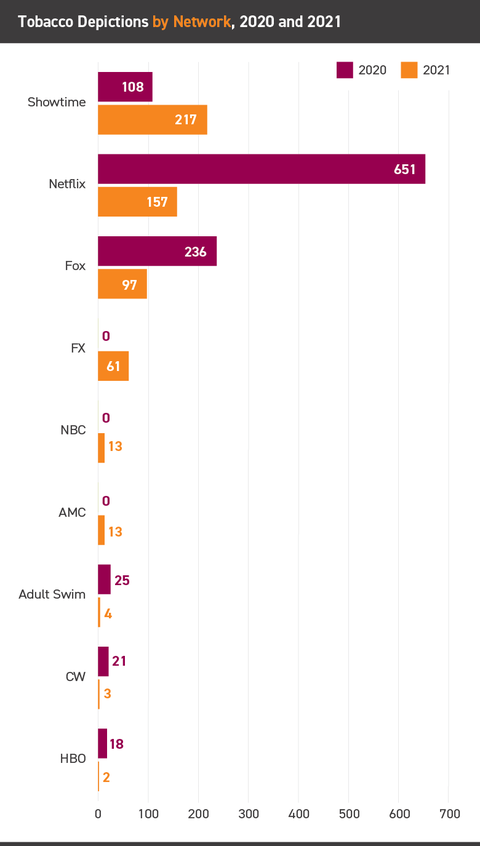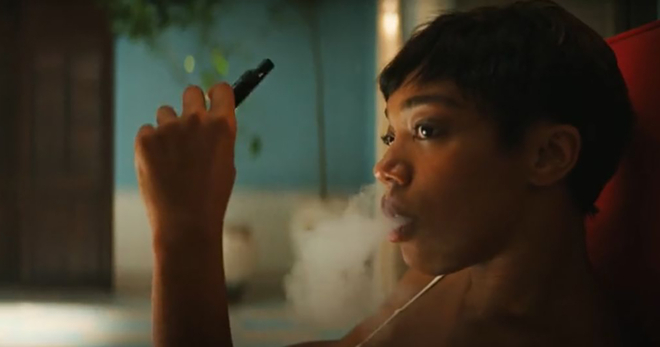
Tobacco’s starring role
How on-screen tobacco imagery drives youth e-cigarette use and what the entertainment industry can do to change the picture
EXECUTIVE SUMMARY
Tobacco imagery maintained its recurring and often starring role in popular on-screen entertainment in 2021, alongside some incremental progress, according to Truth Initiative’s fifth annual look at tobacco imagery in entertainment, “While You Were Streaming: Tobacco’s Starring Role.” The report once again analyzes tobacco imagery across the 15 streaming shows most popular among 15- to 24-year-olds, the most binge-watched shows, as well as the year’s most popular movies and music videos.
On-screen tobacco imagery across varied media point to a persistent problem with the normalization and glamorization of smoking and vaping in entertainment media and pop culture. Long-established research tells us that smoking in movies prompts young people to start using tobacco, and Truth Initiative research published in 2020 was the first to establish that link with episodic streaming entertainment, demonstrating that exposure to tobacco imagery in such media can triple a young person’s odds of starting to vape. Continued on-screen tobacco depictions are putting today’s younger generations at risk of a lifetime of addiction. Our report finds that:
- 60% of the 15 most popular shows among 15- to 24-year-olds contained depictions of tobacco in 2021, showing no improvement from 2020 and effectively exposing 25 million young people to tobacco imagery.
- The Showtime hit and this year’s top offender “Shameless” more than doubled its number of depictions from its prior season, propelling Showtime to become the platform with the most tobacco imagery.
- Previous top offender Netflix demonstrated a notable decline in tobacco depictions, although youth-rated and frequently binge-watched “Stranger Things” continues to include tobacco imagery despite the network’s 2019 pledge to eliminate tobacco depictions in youth-rated shows.
- 47% of top movies released in 2021 depicted tobacco imagery, according to a separate analysis by NORC at the University of Chicago. Movies with tobacco imagery included the PG-rated “The Girl Who Believed in Miracles” and 17 PG-13-rated or under movies, exposing an estimated 25 million youth and young adults ages 15-24 to tobacco imagery in top box office movies available on streaming.
- Analysis of the top 2021 Billboard songs revealed that 12.8% of songs had 290 tobacco depictions in their music videos and were viewed over 2 billion times, down dramatically from 23% in 2020.
Truth Initiative commends the progress that has come alongside years of increasing pressure from public health organizations, policymakers, and public officials for entertainment companies and creators to do more to address tobacco imagery. However, more needs to be done to make sure these become permanent shifts and that we continue to drive these numbers down to fully end the impact and influence of tobacco in our culture. We especially encourage those in the entertainment industry, both creators and distributors, to build on this recent progress and end tobacco’s on-screen role across all screens. Specifically, Truth Initiative recommends:
- Urging distributors to develop transparent and publicly available anti-tobacco policies and ensure that content creators are aware of these policies.
- Expanding education and outreach to directors, writers, producers, actors, and parents about the harmful and potentially deadly effects of tobacco content on screen and the importance of keeping all tobacco products out of shows that young people watch.
- Including anti-smoking and anti-vaping messages before and during shows that feature tobacco imagery, demonstrating the harmful effects of increasingly popular e-cigarette products.
- Ensuring that content with tobacco depictions is not eligible for local tax breaks and other incentives and that no parties or persons involved with a production were compensated in exchange for including tobacco depictions in a show.
- Continuing and expanding ongoing research to document and understand the impact of streaming on youth culture and the many ways that it can impact youth health.
- Providing viewers with static screen shots that present validated and evidence-based resources to assist youth with nicotine dependence, much like the way streaming companies handle suicide prevention, eating disorders and other illnesses that affect youth.

60% of the 15 most popular shows among 15- to 24-year-olds contained depictions of tobacco in 2021, showing no improvement from 2020 and effectively exposing 25 million young people to tobacco imagery.
INTRODUCTION
Tobacco imagery maintained its recurring and often starring role in popular on-screen entertainment in 2021, even as rigorous, peer-reviewed research shows that these images can influence young viewers to start using tobacco products. Truth Initiative’s fifth annual analysis of tobacco in entertainment finds 60% of the 15 most popular shows among 15- to 24-year-olds contained depictions of tobacco in 2021 — the same as 2020 — effectively exposing 25 million young people to tobacco imagery. On-screen tobacco use, often portrayed as glamorous and edgy, not only remained common across young people’s favorite shows, but also among the year’s top movies and music videos, which were viewed over 2 billion times. Entertainment companies, creators, distributors, artists, actors, and media decision-makers at all levels need to understand the consequences of this imagery and refuse to allow their platforms to help the tobacco industry put a new generation at risk for a lifetime of nicotine addiction.
As the youth vaping crisis persists — with over 2.5 million middle and high school students using e-cigarettes, according to the latest data from the Centers for Disease Control and Prevention — research shows on-screen tobacco imagery is directly contributing to the crisis. A landmark 2020 Truth Initiative study published in Preventive Medicine found that exposure to smoking imagery through episodic programming can triple a young person’s odds of starting to vape nicotine. These findings add to well-established research that confirms how exposure to smoking in movies causes young people to start smoking, a conclusion reached in a 2012 Surgeon General report. Nicotine is uniquely harmful to developing brains and can disrupt the formation of brain circuits that control attention, learning, and may make youth more susceptible to addiction at a later age. Vaping nicotine can intensify symptoms of depression and anxiety and increase stress levels, establishing a worrisome link to the growing youth mental health crisis, which was the subject of a Surgeon General’s Advisory issued in December 2021.
At a critical time for the health of young people, there are some incremental signs of progress in reducing tobacco imagery on screen. Though the number of top shows featuring tobacco — 60%— was the same as 2020, nearly all shows that had previously appeared on the list decreased the amount of smoking and vaping imagery compared to their last season. Only one show — Showtime hit and this year’s top offender “Shameless” — increased its tobacco depictions. Netflix, last year’s top-offending platform, markedly decreased its tobacco depictions from 651 in 2020 to 157 in 2021. Progress also extended to music videos and movies: for music videos, 12.8% of the top 2021 Billboard songs included tobacco, a drop from 23% in 2020. A separate analysis by NORC at the University of Chicago of top movies released in 2021 finds that nearly half (47%) depicted tobacco imagery. This was up from 38% in 2020, when many films delayed a theatrical release, but down from 51% in 2019, which may be a more comparable year. It is important that these signs of progress continue and become part of permanent policies among creators and distributors of youth-appealing content of all kinds.
Since Truth Initiative first sounded the alarm on the prominence of tobacco in streaming content and other pop culture entertainment with its 2018 report, “While You Were Streaming: Tobacco Use Sees a Renormalization in On-Demand Digital Content, Diluting Progress in Broadcast & Theaters,” entertainment companies and creators have faced increasing pressure from public health organizations, policymakers, and public officials to do more to address tobacco imagery. A coalition of public health groups and researchers have been spreading awareness of the issue among decision-makers. State and federal officials, including the National Association of Attorneys General and a group of U.S. senators, have repeatedly urged industry leaders to take greater action to limit youth exposure to tobacco imagery given the public health consequences.
Industry leaders must accelerate progress to protect young viewers from tobacco imagery. Necessary actions include developing and publishing comprehensive policies that prohibit the normalization of tobacco, certifying that companies have not received industry payoffs, and distributing tobacco and vaping prevention messages. There is an opportunity for companies and creators to heed the call and prioritize the health of young people over depictions of a highly addictive and harmful product. We encourage those who play any role in deciding whether tobacco stars in content popular with young people to build on this recent progress and end tobacco’s role across all screens. The entertainment industry should not allow their platforms to help the tobacco industry addict a new generation of young people to nicotine. They have the power, and the facts about the impact of smoking and vaping imagery on youth, to change the picture for good.

A landmark Truth Initiative study published in Preventive Medicine found that exposure to smoking imagery through episodic programming can triple a young person’s odds of starting to vape nicotine.
SHOWS POPULAR WITH YOUNG PEOPLE CONTINUE TO INCLUDE TOBACCO
In the U.S., people still report watching TV shows and movies at home as their favorite entertainment activity, according to a 2022 survey from Deloitte. Streaming continues to rise in popularity: in July 2022, streaming services outperformed both cable and broadcast TV for the first time, taking 34.8% of total U.S. viewership compared to cable’s 34.4% and broadcast at 21.6%. A plethora of streaming video subscription services offer increasing opportunities to stream content.
Our latest analysis of shows finds that tobacco maintains a strong presence in shows most popular with young people. Our partners at Breathe California Sacramento Region — a nonprofit dedicated to improving lung health in California — analyzed and coded tobacco content in the year’s most popular shows. In 2021, 60% (9 out of 15) shows most popular with young people contained tobacco imagery, showing no improvement from last year and exposing 25 million young people to shows with tobacco. The 9 shows with tobacco content among the top 15 most popular shows were “Shameless,” “The Simpsons,” “American Horror Story,” “American Horror Stories (spin off),” “Big Mouth,” “On My Block,” “The Walking Dead,” “Rick and Morty,” and “Riverdale” and featured a total of 425 depictions across all shows. [See “Methods for Show Selection and Analysis” on page 18 for a full list of shows].
While this marks an increase in the total number of depictions compared to 2020 — when 390 depictions appeared across the top 15 shows — one show, “Shameless,” was the main culprit featuring significantly more tobacco depictions than the rest. The Emmy-winning Showtime comedy topped the list of tobacco offenders with 217 tobacco depictions in its 11th and final season, more than doubling depictions from its 2020 season and including more depictions than the other top shows combined. The show is no stranger to tobacco imagery: it has been a repeat tobacco offender since it topped the list with 226 tobacco depictions in 2018. This year, the show remains an outlier compared with other popular shows that have significantly reduced tobacco depictions and imagery. “The Simpsons” (Fox), “Big Mouth” (Netflix), and “Rick and Morty” (Adult Swim) — all popular animated shows, which is especially concerning in terms of youth appeal — marginally reduced their number of tobacco incidents compared to last year but failed to eliminate the imagery entirely and continue to expose young people to tobacco.
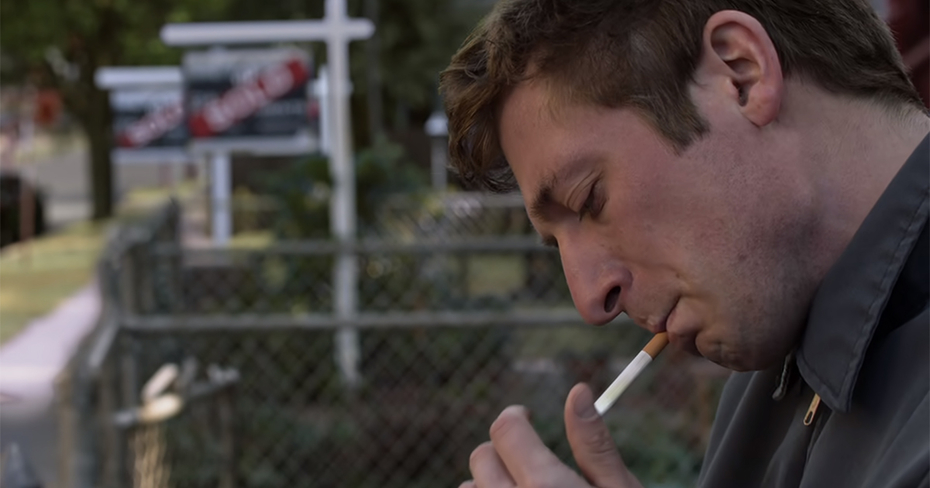
“Shameless” made Showtime the streaming platform with the most tobacco imagery, ousting previous top offender Netflix, which demonstrated a marked decline in tobacco depictions.
SHOWTIME, NETFLIX, AND FOX TOP THE LIST OF TOBACCO DEPICTIONS BY NETWORK
“Shameless” made Showtime the streaming platform with the most tobacco imagery, ousting previous top offender Netflix, which demonstrated a marked decline in tobacco depictions. While Netflix was the #2 offender this year with 157 depictions, it is notable that that number is down dramatically from 651 in 2020. Although Netflix has significantly reduced tobacco depictions since 2020, the platform continues to include frequent tobacco depictions in its shows most popular with young people, including the cartoon comedy “Big Mouth” and the TV-14-rated high school drama “On My Block.” These popular shows continue to include tobacco imagery despite Netflix’s 2019 pledge that it would eliminate tobacco in future programming rated TV-14 or below and cut back on depictions overall. In 2021, FOX came in third with 97 depictions, down from 236 last year, with popular animated hits “The Simpsons” and “Family Guy” frequently featuring tobacco.
It is important to note that other platforms can be involved in distributing content in many ways, including by sharing current or previous seasons of popular shows or by making individual episodes available for purchase. For example, “Shameless,” originated by the platform Showtime, is also available to stream in some capacity on distributing platforms Fubo TV, Prime Video, Roku, Netflix, Amazon Video, Vudu, Apple TV, Hulu, and Google Play. Fox’s “The Simpsons” is also distributed on DirectTV, Fubo, FX Now, Amazon Video, Apple TV, Vudu, Google Play, Microsoft Store, and Hulu. Disney, which now owns Fox, also streams “The Simpsons” on Disney+, even though Disney has one of the strongest policies on tobacco imagery and prohibits smoking in its youth-rated movies (G, PG, and PG-13). The wide range of platforms providing access to popular shows with heavy tobacco imagery multiplies the total audience for content well beyond its original distributor and can vastly increase the potential impact of tobacco imagery on young people. Platforms that choose to distribute content with tobacco imagery play a role in magnifying youth nicotine use and need to be held accountable.
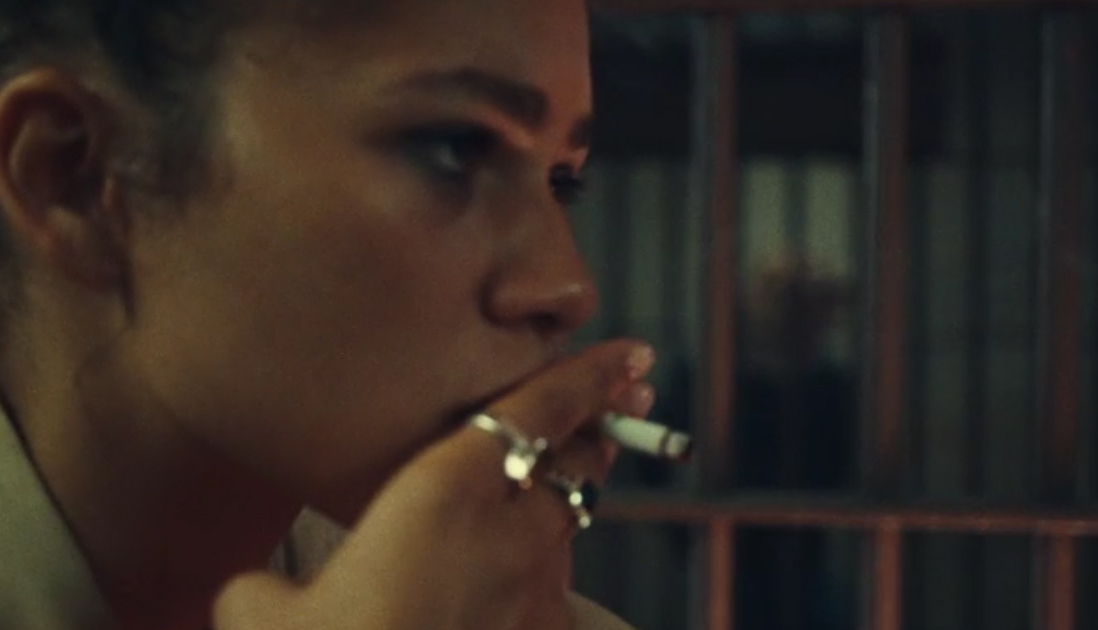
High school drama “Euphoria” features heavy nicotine use
HBO’s “Euphoria” was frequently binge watched this year, with young people watching multiple or all episodes of the show’s previous seasons. The first season of the show — a high school drama starring Emmy-winning actress Zendaya — aired in
2019 and contained 312 tobacco depictions, with tobacco imagery in every episode. Although a full season of “Euphoria” did not air in 2021, two special episodes aired that year, with one episode including tobacco depictions. Its second season aired in 2022 and contained 200 tobacco depictions across all eight episodes. (A previous version of this report misstated this number as 137 tobacco depictions in seven out of eight episodes.)
Although tobacco depictions may be down in the 2022 season of “Euphoria,” the show continues to have a cultural impact. In season one, a minor background character dubbed “Vape Girl” rocketed to popularity, known for delivering sage advice and zippy one-liners, usually while prominently vaping. The character remains popular during the show’s second season, achieving meme status.
BINGE-WORTHY SHOWS CONTINUE TO DEPICT TOBACCO IMAGERY
Young people continued to binge-watch current and older seasons of popular shows. Binge-watching presents a continuing avenue for significant tobacco exposure on screen and is an important behavior to examine: watching shows in a compressed timeframe may influence the amount and intensity of exposure. Research shows that the more exposure a young person has to tobacco imagery, the more likely they are to vape. According to a 2018 poll by Morning Consult, 73% of young adults 18-29 who use streaming services binge-watch TV — watching two or more episodes of a show — once a week.
In addition to analyzing the top 15 shows most popular with young people in 2021, we wanted to see to what extent young people were binge-watching older seasons of popular shows featuring heavy tobacco imagery. We asked young people if they had binge-watched previous seasons of popular shows we flagged as tobacco offenders in the past. We found that young people binge-watched older seasons of nearly all top 15 most popular shows, as well as previous seasons of other popular shows laden with tobacco imagery including “Stranger Things,” “Family Guy,” “Criminal Minds,” “Bob’s Burgers,” “Euphoria,” “13 Reasons Why,” and “Fuller House.”
Binge-watching previous seasons of shows with tobacco imagery reduced progress made from declines in tobacco depictions in some 2021 top shows. Shows like “Stranger Things,” “Family Guy,” “Euphoria,” and “The Simpsons” may have reduced tobacco imagery in their current seasons, but young viewers are still watching older seasons with heavy tobacco imagery. Because seasons of shows with intense tobacco content enjoy tremendous popularity for years after their original airing, they have the potential to impact young people’s tobacco habits for years to come.

Tobacco in Emmy-winning shows
“Euphoria” and “Squid Game” won Emmys in 2022, adding to the accolades and reach of these popular shows that heavily feature smoking imagery. “Squid Game,” the South Korean survival drama from Netflix which topped the network’s list of top 10 most-watched non-English TV and films the week it premiered and earned actor Lee Jung-jae an Emmy for lead actor, included 76 tobacco depictions. Emmy-winning shows receive more press attention, and are hailed as culturally significant, thus increasing the likelihood of future seasons — all of which amplify the negative impact of on-screen tobacco use and smoking on young viewers.
TOBACCO SATURATES ANIMATED SHOWS
Cartoons continue to include tobacco imagery in shows that are rated for youth and heavily binge-watched. This year, “The Simpsons” (PG) was the #1 most popular show with young people and had the third highest number of tobacco depictions (75), though that was down from 95 depictions in 2020. Fox’s “Family Guy,” dropped from 100 to 22 tobacco incidents, but both shows are still popular to binge-watch among young people. “The Simpsons” is also available on Disney+, despite Disney’s policy to limit tobacco in its youth-rated movies.
Fox isn’t the only offender when it comes to cartoons. “Rick and Morty” on Adult Swim and “Big Mouth” on Netflix are repeat tobacco offenders, although they also reduced the number of tobacco depictions. Fox’s “Bob’s Burger” went from 41 depictions in 2020 to zero in its latest season, showing that it is possible to eliminate all tobacco. Although animated shows are moving in the right direction by cutting tobacco depictions, we encourage networks to move toward the goal of zero tobacco imagery in content popular with youth.

“Stranger Things” continues prominent tobacco use
Netflix continues to include tobacco in shows popular with young people and rated appropriate for youth. Most young people we surveyed (64%) said that they binge-watched multiple or all episodes of previous seasons of “Stranger Things” in 2021, making its previous seasons the most binge-watched of past tobacco offenders among young people in 2021. Past seasons of the show have included heavy tobacco imagery, including 721 depictions and 261 depictions in the 2019 and 2017 seasons, respectively.
The latest and fourth season of “Stranger Things” (rated TV-14) aired in June 2022 and included 89 tobacco depictions, despite the company’s 2019 announcement that it would eliminate tobacco in programming rated TV-14 or below. The 2022 season also saw controversy over its continued “TV-14” rating, with the Parent Television and Media Council concluding that Netflix’s maturity rating for the show was inaccurate, based on a drastic increase in violence and profanity.
Given its continued popularity, young people are continually exposed to the massive amounts of tobacco imagery in past seasons, in addition to tobacco imagery in its 2022 season.
VAPING IMAGERY REMAINS STEADY
This year’s analysis indicates that depictions of vaping nicotine decreased slightly from 1.8% to 1.4% of tobacco depictions across top 15 shows but as the research shows, smoking imagery is driving youth vaping initiation. One especially troubling example of e-cigarette use on screen appears in the top 15 show “American Horror Stories” spin off, which features a person under 18 vaping nicotine. Truth Initiative continues to monitor vaping imagery on screens.

Tobacco imagery continues to maintain a strong presence in popular movies, including those rated appropriate for youth.
NEARLY HALF OF TOP 2021 MOVIES CONTAIN TOBACCO IMAGERY
Tobacco depictions aren’t limited to those in streaming shows. A 2012 report issued by the Surgeon General stated that exposure to tobacco use in cinema irrefutably leads some youth and young adults to try tobacco products. An analysis of tobacco depictions in top 2021 movies by NORC at the University of Chicago finds that despite progress, tobacco imagery in movies continues to be a problem.
The report finds that nearly half (47%, 53 out of 112) of top films released in 2021 featured tobacco, exposing an estimated 25 million youth and young adults ages 15-24 to tobacco imagery in top box office films available on streaming. Tobacco imagery infiltrated films rated appropriate for youth once again, with 17 youth-rated films containing tobacco, including the PG-rated film, “The Girl Who Believed in Miracles,” which had eight instances of cigarette imagery. The PG-13-rated movie “The Marksman” starring Liam Neeson topped the list of youth-rated movies with 313 tobacco incidents, followed by “Venom: Let There be Carnage” featuring Tom Hardy and Tom Holland with 137 incidents. “Respect,” starring Jennifer Hudson as Aretha Franklin, had 92 incidents. Youth-rated movies contained, on average, 30 tobacco depictions per film.
The 17 movies containing tobacco that were rated PG-13 or under are:
- 12 Mighty Orphans, PG-13
- A Journal for Jordan, PG-13
- The Courier, PG-13
- Escape Room: Tournament of Champions, PG-13
- The Girl Who Believes in Miracles, PG
- Here Today, PG-13
- The Jesus Music, PG-13
- King Richard, PG-13
- The Marksman, PG-13
- Minari, PG-13
- No Time to Die, PG-13
- Reminiscence, PG-13
- Respect, PG-13
- Shang Chi and the Legend of the Ten Rings, PG-13
- The Unholy, PG-13
- Venom: Let There Be Carnage, PG-13
- West Side Story, PG-13
The top films featured a total of 2,381 instances of tobacco imagery – more than double the number of incidents seen in 2020 films. However, 2019 statistics may be better suited for comparison because of the impact COVID-19 had on movie production, resulting in fewer movie releases in 2020. The movie industry has made incremental moves in the right direction compared to 2019, with slight decreases in the percentage of newly released movies containing tobacco (51% vs. 47%), the number of youth-rated movies with tobacco (29 vs. 17) and the average number of tobacco depictions per film (26 vs. 21).
Most depictions (84%) were of combustible tobacco products. Research shows that exposure to smoking on screen is tied to youth vaping initiation, making pervasive smoking imagery a concern. This year also saw a rise in smokeless tobacco imagery in the PG-13 rated films “The Marksman” and “Minari” which contained 85 and four smokeless tobacco incidents, respectively, up from zero smokeless product images in 2020 films.
Although R-rated movies continued to have the greatest number of tobacco depictions, average depictions per film were only slightly higher than the 30 depictions per film average for youth-rated movies. The rising popularity of films released through streaming services may leave ratings unable to protect young viewers from tobacco depictions. There is no measure to gauge the age of viewers watching via streaming services, leaving it impossible to determine how many young people were exposed to tobacco imagery in mature-rated films.
The report also shows that studios that are not members of the Motion Picture Association (MPA) (e.g., TrailMaker Productions, MGM, and BRON Studio) consistently released more youth-rated films featuring tobacco and included more tobacco incidents per film compared to those who are a part of the MPA (e.g., Walt Disney, Paramount, Sony, Universal City, Warner Brothers Entertainment, and Netflix). Most MPA members have written policies to keep tobacco out of youth films. The exception is Netflix, which says it has a policy but has yet to make it publicly available.
Tobacco imagery continues to maintain a strong presence in popular movies, including those rated appropriate for youth. The fact remains that tobacco imagery in movies is a serious concern and studios aren’t doing enough to remedy the situation.
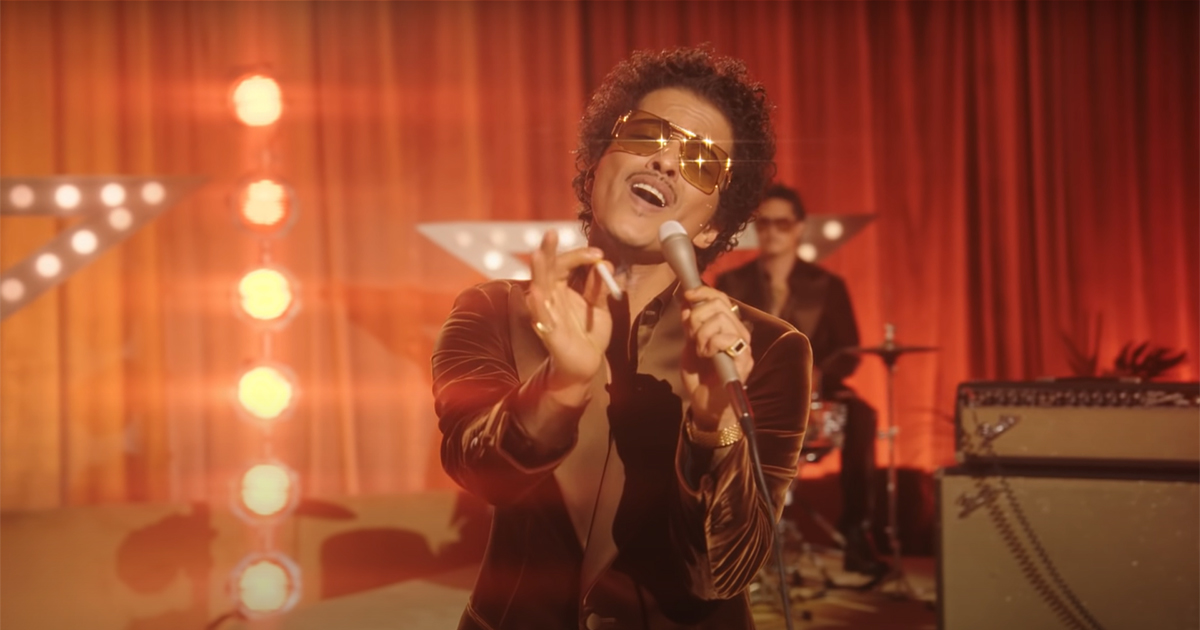
TOBACCO IN MUSIC VIDEOS
Music videos provide another platform for youth exposure to tobacco, and often portray tobacco use as edgy, glamorous, and cool. Analysis of the top 2021 Billboard songs revealed that 12.8% (31 of 243) of songs had 290 tobacco depictions in their music videos and were viewed over 2 billion times. “Smokin out the Window” by Anderson .Paak, Bruno Mars, and Silk Sonic topped the list of music videos featuring tobacco imagery with 109 incidents, followed by “El Incomprendido” by Farruko (55), “Drunk (And I Don’t Wanna Go Home)” by Elle King and Miranda Lambert (27), “Blinding Lights” by The Weeknd (11), and “Paralyzed” by Sueco (10). R&B/Hip Hop videos continue to have the most tobacco depictions (24%) of all genres, the majority of which (84%) are portrayed by people of color. Pervasive imagery of people of color using tobacco on screen plays a role in worsening disparities in tobacco use by populations who have been historically targeted by the tobacco industry. More than half of tobacco incidents (186) were of cigarettes, followed by pipes, images that were indistinguishable as either blunts or cigars, and cigars. There was one depiction of an e-cigarette in “Escape Plan” by Travis Scott.
Although tobacco depictions and percentage of music videos with tobacco imagery are down from 2020 (23%, 522 depictions), we cannot underestimate the impact of this media form on tobacco exposure, especially given the lack of parental controls or age-gating on platforms like YouTube and lack of data on the age of individual viewers and how often viewers re-watch music videos.
Shows that reduced or eliminated tobacco
Some shows and networks made progress this year by reducing or eliminating tobacco depictions. All previous tobacco offenders except “Shameless” and “Riverdale” decreased the number of tobacco incidents in their 2021 seasons, and “Bob’s Burgers” and “All American” eliminated tobacco imagery entirely. There were also fewer youth-rated shows with tobacco depictions: only four of the top 15 shows with tobacco depictions in 2021 were rated TV-14 and below (“The Simpsons,” “Rick and Morty,” “Riverdale,” and “On My Block”), down from seven in 2020.It is important to note, however, that youth-rated cartoons with tobacco imagery like “The Simpsons” and “Rick and Morty” are especially egregious given their format and because their plotlines have no need for historical accuracy.
ENDING TOBACCO IMAGERY ON SCREENS
In our fifth annual report highlighting the pervasiveness of tobacco imagery on screens, we see progress as well as the opportunity to do more. The current media landscape with streaming on demand on multiple devices at any time raises the stakes of the impact of tobacco imagery. Not only is it harder for parents to know what their children are watching, platforms designed for binge-watching behavior potentially expose more young people to tobacco. Until content creators and distributors take responsibility, millions of young people will continue to be exposed to tobacco imagery, which can triple the odds that they will try vaping nicotine compared to peers with no exposure.
While some shows and platforms have made strides in reducing or eliminating tobacco, many others that continue to depict tobacco imagery need to catch up—and stick to their word. Following the publication of our 2019 report, Netflix announced that it would eliminate tobacco in youth-rated programming and cut back on depictions across the board. Its specific policy is not public. Although the platform has cut back on tobacco depictions this year and added a smoking warning label at the beginning of certain programs, it continues to include pervasive tobacco in its most popular shows rated appropriate for youth. Fox decreased its tobacco depictions compared to last year, but continues to be a top tobacco offender with youth-appealing and frequently binge-watched animated shows like “The Simpsons” and “Family Guy.” Meanwhile, Showtime appears to have moved in the wrong direction, more than doubling tobacco depictions in its popular show “Shameless,” making it the top offender this year.
Many other platforms redistribute popular shows featuring tobacco. For example, “The Simpsons” is broadcasted on Fox, but is also available on at least 10 other platforms, including Disney+, even though Disney has a strong tobacco policy for its youth-rated movies. This highlights the limitations of policies that don’t extend to all content on a platform and points to an overall problem with a media landscape that allows many avenues for re-distribution of tobacco imagery. Networks can and should do better.
The entertainment industry is facing increasing pressure from public health groups, policymakers, and other public officials to do more. In 2019, the National Association of Attorneys General expressed concerns about tobacco imagery in streaming content and sent letters to major U.S. streaming services to urge the industry to implement measures to protect young people from tobacco imagery. The letters, which 43 state and territory attorneys general signed, were sent to Amazon.com, Apple, AT&T, CBS Corporation, Comcast Corporation, Discovery, The Walt Disney Company, Google, Netflix, Sony, Lionsgate, Viacom and Walmart. In October 2020, a similar contingent of attorneys general sent letters to the writer’s guilds, asking them to persuade members of the creative community to “depict tobacco imagery responsibly, while still supporting artistic freedoms.” In March 2022, Senators Edward J. Markey, Chris Van Hollen and Richard Blumenthal cited our 2021 findings in a letter to Netflix urging the streaming giant to take steps to decrease young people’s exposure to tobacco, nicotine, and vaping imagery in video content. Following the premiere of the latest season of “Stranger Things” in June 2022, Truth Initiative sent Netflix a letter from a coalition of 13 public health and research organizations urging the company to implement its past pledges for youth-appealing content free of tobacco imagery. In 2022, Truth Initiative representatives also were invited to speak with the WHO Framework Convention on Tobacco Control (FCTC) Secretariat to highlight our work on tobacco imagery on screens and discuss opportunities for collaboration.

The entertainment industry is facing increasing pressure from public health groups, policymakers, and other public officials to do more. While some shows and platforms have made strides in reducing or eliminating tobacco, many others that continue to depict tobacco imagery need to catch up—and stick to their word.
To truly reduce youth exposure to tobacco imagery, Truth Initiative calls for a comprehensive set of policies to curb tobacco depictions on screens, including:
- Urging distributors to develop transparent anti-tobacco policies - Media companies, creative guilds and show runners should create comprehensive policies that do not support the normalization of tobacco and make policies publicly available.
- Ensuring that content creators are aware of these policies - Content creators need to understand why creating popular characters like “vape girl” have enormous detrimental impacts on youth vaping nicotine, and why distributors need tobacco policies in place.
- Expanding education and outreach – Many stakeholders may not be aware of the harmful and potentially deadly effects that tobacco content can have on youth and young adults. Thus, it is important to educate creatives in the entertainment industry, including directors, writers and producers, as well as parents about the importance of keeping tobacco out of shows. Learn more about and join Truth Initiative’s long-standing Tobacco-Free Screens coalition of organizations committed to changing the picture.
- Informing actors of the power they wield when they use tobacco on screen – Actors and actresses like Emma Stone and Colin Farrell have lately been vocal advocates for their characters to use tobacco on-screen. Actors rejecting smoking/vaping nicotine on screens would be a powerful statement about the harms of tobacco use.
- Continuing anti-tobacco and anti-vaping ads – Anti-tobacco messages have been enormously successful in reducing tobacco use rates and should be deployed before and during shows that feature tobacco imagery. These messages should include specific anti-smoking and anti-vaping messages that demonstrate the harmful effects of increasingly popular e-cigarette products.
- Implementing a robust ratings system – Designating titles with smoking as TV-MA — designed for adults and unsuitable for those 17 and under — has the potential to reduce young people’s exposure to tobacco. TV Parental Guidelines, which do not currently treat tobacco as an explicit rating factor, would provide more clarity and information for parents who seek to limit the tobacco content their children consume. Triggering an “R” rating for movies with tobacco could serve as a financial disincentive to movie makers, especially given that 2022 saw the lowest percentage of box office revenue go to R-rated films in over 25 years.
- Certifying no tobacco industry payoffs – Big Tobacco has an overt interest in the continued presence of tobacco on TV, in movies, and in streaming content. It is essential that the film industry proves that no parties or persons involved with a production received anything of value in exchange for including smoking or vaping depictions in a show.
- Refusing website advertisements from tobacco brands or tobacco companies – Vaping giant JUUL placed banner and video ads on Cartoon Network and Nickelodeon-owned websites nick.com, nickjr. com and cartoonnetwork.com. Youth-focused networks should never accept advertising money that explicitly targets young audiences with an addictive product, and this policy should extend to network websites as well. Further, tobacco companies like Altria place ads on streaming services with advertisements, such as Hulu.
- Ensuring public subsidies do not fund content with tobacco – Content with tobacco depictions should not be eligible for local production subsidies, including tax breaks and other incentives. States should change their production subsidy policies to provide tax and other incentives only for those productions that do not promote tobacco use.
- Continuing and expanding ongoing research – We continue to need more information about the harmful effects of tobacco imagery. A rigorous and ongoing monitoring of tobacco imagery, including how it is portrayed and who is watching, is needed by reputable non-media/tobacco industry researchers. It is critical to document and understand the impact of streaming on youth culture and the many ways that it can impact youth health. Media companies should provide researchers with the raw data needed to produce valid results (i.e., viewership data).
- Providing resources for tobacco dependence – Much like streaming companies do for suicide prevention, eating disorders and other illnesses that affect youth, companies should provide static screen shots with validated and evidence-based resources such as This is Quitting to assist youth with nicotine dependence. Teens and young adults can join This is Quitting for free by texting DITCHVAPE to 88709.
More in tobacco in pop culture
Want support quitting? Join EX Program
By clicking JOIN, you agree to the Terms, Text Message Terms and Privacy Policy.
Msg&Data rates may apply; msgs are automated.

